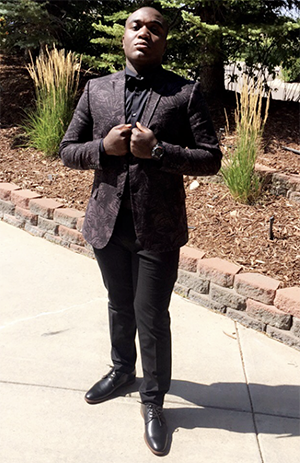
By Mike Kilen
GCU News Bureau
The national unrest over policing and race this summer hit close to home for some Grand Canyon University Criminal Justice students.
Last spring, they produced strategic plans to combat the problems that can lead to tragedies such as the death of George Floyd and the subsequent murder charges of a Minneapolis police officer.
“The key to really helping the people understand what the police do and vice versa is community engagement,” said Wilton Mercy, a senior in Criminal Justice who produced a plan for the Chicago Police Department and a segment of the city that is predominately Latino as part of a Community Based Strategic Planning class.
He found that police departments that learn more about the population and adapt to their standards create more trust and prevent people from working against officers.

His project relied on research that examined the history of relationships between the community and police, adverse events that occurred and what caused them.
“The patterns I noticed were the same things going on today. It was behavior of police officers and the people, a history between them that started with small racial blockades,” he said.
His suggestions for change included increasing police standards, having supervisors who held them accountable, hiring more police from the backgrounds of the population in the area and planning consistent engagement with the community.
“I don’t think a lot of police departments train officers on the cultures they are policing,” he said.
The Community Based Strategic Planning Class, typically taken in the last year of the Justice Studies program, was launched four years ago after instructor Cornel Stemley conducted research with police departments and found many were embracing evidence-based strategic planning but lacked time, funding and qualified personnel to conduct the scientific research that expands on community policing models introduced in the late 1980s.
Scientific studies and data collected from specific populations, such as conducting focus groups, surveys, or interviews, are used for an objective approach to community problems, he said.
“The job opportunities for students to help develop those plans are wide open,” he said. “Agencies don’t have people that can do that because it’s time consuming. And police departments don’t embrace that unless its indoctrinated in the culture, which takes a long time.”
He teamed students with GCU librarians to do intense research on the demographics of several cities that were flagged by the Department of Justice for violating Constitutional rights. They examined demographics and the DOJ reports and provided solutions. Some reports were to be submitted to the police departments and discussed before COVID-19 sidelined that effort.
The project provides students with critical thinking, teamwork and data analysis skills that will help them advance within departments.
Strategic plans are like making a diet plan for the week, he said. You don’t randomly eat on a whim each day but develop a plan with goals and objectives.
The plan forms by interacting with the community, not by telling people what they need but learning what they need.
“When people commit criminal acts, they are not doing it just to be doing it. It’s because they have a certain need, a certain problem,” Stemley said.
Students learn of community groups that can help meet those needs and match them with people. But from personal experience working in police departments, Stemley found a good plan needs “to put love into it.”
It engages the heart as well as the mind, bringing together community members who want to see the plan through because they live there.
Police officers soon tire of arresting people over and over, he said, and should ask, “What’s going on?”
“It is all about respect, treating people like they are human. No one is exempt. Someone can always fall on bad times, fall into drug addiction, lose their jobs which causes them to drink, get a DUI and get arrested. So we take care of those issues and supply support and interact with them before they get in trouble.”
Another student, Victoria Sakakibara, found in her project that the ties between the community members and police were vital.

It wasn’t happening in Ferguson, Mo., the subject of her research. The city was well-known after the shooting death of Michael Brown in 2014 by a white police officer and the resulting protests that resembled what is happening today.
Police there were not following protocols and didn’t have strong community ties in the minority communities of the city, she learned in her research.
“Police should receive training on culture and ethnicity. They need to empathize with everybody,” she said.
She recommended community programs that allow the police and population to know each other, mental health programs for officers to decrease stress and increased training to better the quality of policing.
“The George Floyd situation was heartbreaking. Even though I’d done the research, part of me was still surprised,” she said.
Sakakibara graduated in April and is working as an assistant at a law firm while considering law school. Her mom always encouraged her to be a person that goes out and changes the world.
“The project really helped me see that we do have problems in the world. We do have police departments that need help to establish better programs and ties within the community. I hope to see those changes in the world.
“Everyone deserves to feel safe. If we don’t have that it creates chaos.”
Grand Canyon University senior writer Mike Kilen can be reached at [email protected] or at 602-639-6764.
****
Related content:
GCU Today: Justice Studies students prepare for life behind the badge
GCU Today: Justice, not punishment, is focus of GCU program
GCU Today: CHSS offers new degrees plus new curriculum twists



































































